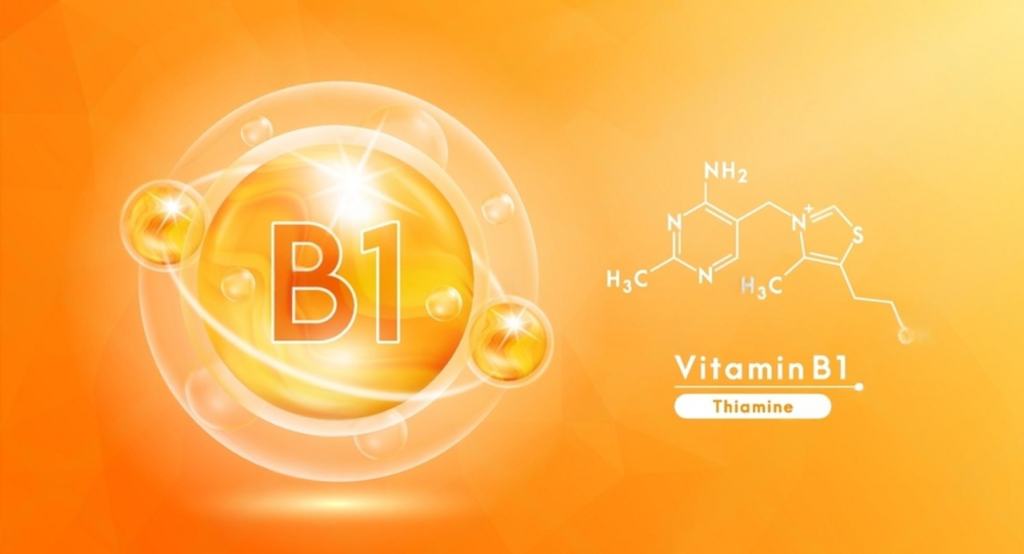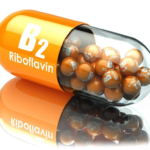This is for informational purposes only. For medical advice or diagnosis, please consult a professional.
What Is Thiamine Vitamin?
Thiamine is also known as vitamin B1. It is a water-soluble vitamin and a member of the B complex group. It plays a vital role in energy metabolism, nervous system, etc. The body can not store it for long periods of time in large amounts. The body uses the required amounts while the excess amounts are excreted through urine. That is why it should be obtained regularly.
What Is Thiamine Good For In The Body?
Thiamine (vitamin B1) is one of the B complex group. It is good for playing different roles in the body such as:
Role in Energy Production
It plays a role in converting carbs into energy. Without it, your body struggles to break down food effectively, leading to fatigue and lethargy.
Supports Nervous System
It helps to maintain a healthy nervous system. Ensuring that signals are transmitted correctly between the brain and body.
Metabolism and Digestion
Vitamin B1 also plays a role in breaking down proteins and fats, making it important for overall metabolism and digestive health.
Rich Food Sources Of Thiamine
Animal-Based Sources
- Meat
- Fish (such as trout and salmon)
- Eggs
- Liver
Plant-Based Sources
- Whole grains (like brown rice, oats)
- Legumes (such as beans, lentils, peas)
- Nuts and seeds (such as sunflower seeds, flaxseeds)
- Vegetables (like asparagus, spinach, Brussels sprouts)
Fortified Foods
Many processed foods, such as cereals and bread, are loaded with thiamine (vitamin B1) to help meet nutritional needs.
Signs Of Thiamine Lack
Thiamine (vitamin B1) lack occurs when you don’t get enough from food due to certain factors. Here is a more detailed breakdown of the signs of thiamine lack:
Early Symptoms:
- A general feeling of tiredness and increased sensitivity.
- Difficult to remember things, especially short-term memories.
- Reduced desire to eat.
- Difficulty falling asleep or staying asleep.
- Generalized feelings of discomfort or pain in the stomach area.
- Unintentional weight loss due to decreased appetite and metabolism.
Symptoms of Beriberi (Severe Thiamine Deficiency):
Nerve Damage (Neuropathy):
- Tingling or numbness in the hands and feet.
- Loss of sensation in the extremities.
- Muscle weakness and wasting.
- Poor reflexes.
- Difficulty with walking or balance.
Cardiovascular Problems:
- Swelling of the hands or feet (edema).
- Swelling in the legs.
- Rapid heart rate (tachycardia).
- Shortness of breath.
- Heart failure.
- Chest pain.
Mental and brain problems:
- Confusion.
- Delirium.
- Mental impairment.
- Wernicke-Korsakoff syndrome (a serious neurological disorder).
- Eye movement problems (nystagmus).
- Blurred vision.
Other Symptoms:
- Nausea and vomiting.
- Muscle cramps.
- Foot drop (inability to lift the foot).
- Involuntary eye movements (nystagmus).
- Decreased muscle function or paralysis of the lower legs
- Pain.
Who Is At Risk of Thiamine Deficiency?
Thiamine deficiency occurs due to many reasons or factors such as genetic problems or may have the following reasons:
Alcoholics
Heavy alcohol consumption reduces thiamine absorption and increases its excretion. It puts heavy drinkers at increased risk of deficiency.
Medical Conditions
People with conditions such as Crohn’s disease, diabetes, or kidney disease may have difficulty absorbing or retaining it.
Pregnant and Breastfeeding Women
During pregnancy and breastfeeding may lead to increased need for it.
Recommended Daily Intake Of Thiamine
The following table lists the current recommended daily allowances (RDAs) for thiamine. For children from birth to 12 months, the NCBI established an adequate intake (AI) for thiamine. That is equivalent to the average intake of thiamine in healthy, breastfed infants.
| Age | Male | Female | Pregnant | Breastfeeding |
| 0 to 6 months | 0.2 mg | 0.2 mg | – | – |
| 7–12 months | 0.3 mg | 0.3 mg | – | – |
| 1–3 years | 0.5 mg | 0.5 mg | – | – |
| 4–8 years | 0.6 mg | 0.6 mg | – | – |
| 9–13 years | 0.9 mg | 0.9 mg | – | – |
| 14–18 years | 1.2 mg | 1.0 mg | 1.4 mg | 1.4 mg |
| 19–50 years | 1.2 mg | 1.1 mg | 1.4 mg | 1.4 mg |
| 51+ years | 1.2 mg | 1.1 mg | – | – |
The Best Ways To Absorb Thiamine Effectively
The best ways to obtain and absorb thiamine effectively are the following:
- Eat a balanced diet that includes whole unprocessed foods.
- Avoid drinking alcohol.
- Cook food lightly, as over cooking can destroy it.
- Take supplements advised by health specialists, if you are at high risk of deficiency.
Can You Take Too Much Thiamine?
Thiamine is water-soluble, meaning it is excreted through urine rather than stored in large amounts. That is why, toxicity is rare. But extremely high doses can cause minor side effects such as nausea or dizziness.
Symptoms Of Too Much Thiamine
The toxicity is rare. Taking too much Thiamine may cause side effects. Consult with a doctor if you have any unusual issue while taking this vitamin.
- Flushing
- Hives
- Itching
- Weakness
- Sweating
- Nausea
- Restlessness
It can cause other side effects. Consult with a doctor if you have any unusual issue while taking this vitamin.
Conclusion
Thiamine (Vitamin B1) is an essential nutrient that is important for energy production, nervous system health, and overall metabolism. Making sure you get enough amounts through a balanced diet or supplements. It plays a role in preventing fatigue, nerve problems, and heart problems. If you suspect a deficiency, consult a healthcare professional for any medical advice.
FAQs
1. What happens if I don’t get enough Vitamin B1?
A deficiency can lead to fatigue, irritability, muscle weakness, and severe conditions like beriberi or Wernicke-Korsakoff syndrome.
2. Can I get enough Vitamin B1 from my diet alone?
Yes! Eating whole grains, lean meats, nuts, and vegetables can provide sufficient Vitamin B1.
3. Do I need a Vitamin B1 supplement?
If you’re at risk of deficiency (e.g., alcoholics, pregnant women, those with medical conditions), supplementation might be beneficial.
4. Is Vitamin B1 safe for everyone?
Yes, it’s generally safe. Since it’s water-soluble, excess amounts are excreted. However, always follow recommended doses.
5. Does cooking destroy Vitamin B1?
Yes, prolonged cooking and high heat can degrade Vitamin B1. Steaming or lightly cooking food preserves more nutrients.



